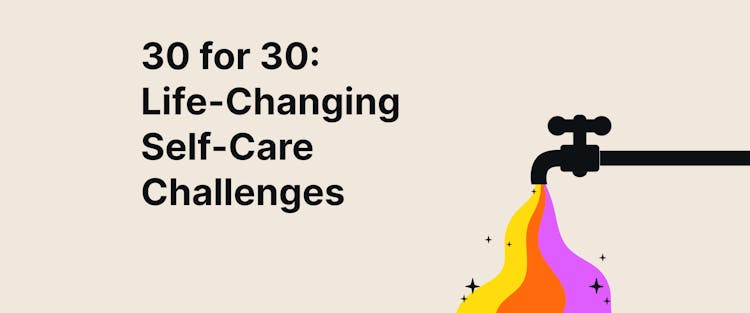Building confidence is a journey that requires time, effort, and honest self-reflection. Whether you’re stepping into a new role, facing a difficult conversation, or simply trying to trust your own abilities more, confidence shapes how you show up in the world.
Confident people stand up for themselves, make decisions with greater clarity, and move forward even when the outcome isn’t guaranteed. In contrast, a lack of self-confidence often leads to hesitation, self-doubt, and the tendency to waste time second-guessing choices instead of acting on them. Over time, this erodes your sense of self, affects your mental health, and distances you from your own confidence.
The good news is that confidence isn’t a fixed trait — you can build it. In this article, we’ll explore practical strategies to help you strengthen your own confidence, trust your abilities, and navigate challenges with more ease and resilience. You’ll learn how confidence works, why self-doubt develops, and what actually helps people grow into a more grounded, self-assured version of themselves.
Along the way, you’ll see how small, consistent actions — such as learning from proven ideas and reflecting on them regularly — can accelerate this process. Tools like the Headway app, which distills key insights from books on confidence, psychology, and personal growth into short, actionable summaries, can make this journey more accessible and easier to sustain.
📘 Build lasting confidence with Headway.
Quick answer: How to build confidence?
Confidence grows when you take small, intentional actions that reinforce trust in your own abilities. To build confidence, focus on caring for your mental health, challenging negative self-talk, setting achievable goals, and consistently following through on them. Confident people don’t wait until fear disappears — they act despite it. Over time, these repeated experiences strengthen your sense of self and help you develop lasting confidence that carries into work, relationships, and everyday decisions.
What is confidence?
Confidence is your belief in your abilities and your assurance that you can handle challenges, make decisions, and manage various situations. It's not about perfection but trusting yourself to face whatever comes your way, including making mistakes and learning from them.

Confidence is essential in all areas of life, driving personal growth, career success, and social interactions. It helps you set and pursue goals, take on challenges, and learn without fear of failure.
In the workplace, confidence leads to initiative, decision-making, and leadership, while socially, it reduces the fear of judgment, improving communication and relationship-building. In education, confidence fosters active participation, critical thinking, and better decision-making, leading to more fulfilling outcomes.
📘 Strengthen everyday confidence with Headway.
Enhancing confidence to improve mental health
Confidence also plays a key role in mental health. It is linked to lower levels of tension and depression, fostering a more positive self-image and resilience. It helps reduce anxiety and stress, as you’re more likely to feel equipped to handle life’s ups and downs. In leadership, confidence is essential for inspiring and motivating others and making tough decisions under pressure. In creative endeavors, confidence allows you to take risks, innovate, and express yourself authentically.
For athletes, confidence is critical in achieving peak performance, as it enhances focus, reduces stress, and improves the ability to bounce back from setbacks. In relationships, confidence contributes to healthy self-esteem and maintaining balanced and fulfilling connections with others. It helps you communicate effectively and express your needs and boundaries. It fosters mutual respect and allows you to impact your interactions with others positively.
Overall, confidence empowers you to live a more fulfilling life, encouraging action, resilience, and the pursuit of personal and professional aspirations. In ‘The Power of Positive Thinking‘, Norman Vincent Peale explores the connection between mental health and confidence, stating,
'Without a humble but reasonable confidence in your own powers you cannot be successful or happy.'
This emphasizes mental well-being's crucial role in building and maintaining confidence.
Low self-confidence often manifests as self-doubt and a lack of belief in your abilities, which can hinder personal and professional growth. It may lead to the avoidance of challenges, missed opportunities, as well as the limitation of overall potential.
📘 Rebuild self-belief with Headway.
Understanding the psychology of confidence
The psychological basis of confidence is rooted in self-efficacy, the belief in your ability to succeed in specific situations or accomplish tasks. This belief is heavily influenced by past experiences; successes build confidence, while failures can diminish it.
Cognitive Behavioral Theory (CBT) suggests that our thoughts, particularly how we interpret events and abilities, significantly shape our confidence levels. Positive self-talk and the ability to reframe negative experiences into learning opportunities are crucial for maintaining confidence.
In ‘Transcend’, Scott Barry Kaufman, Ph.D. examines the psychology behind confidence, noting,
'Within the humanistic psychology framework, the healthy personality is considered one that constantly moves toward freedom, responsibility, self-awareness, meaning, commitment, personal growth, maturity, integration, and change, rather than one that predominantly strives for status, achievement, or even happiness.'
This sheds light on the key psychological elements that are essential for developing and maintaining confidence.
Social comparisons also play a role in social media; when we compare ourselves favorably to others, our confidence can increase, but unfavorable comparisons may have the opposite effect. A growth mindset, the belief that abilities can be developed through effort, also contributes to higher confidence, as it encourages resilience in the face of challenges.
📘 Develop a growth mindset with Headway.
The science behind confidence: What you need to know
The scientific basis of confidence involves various neurological and physiological processes in the brain and body. The prefrontal cortex, responsible for decision-making and self-regulation, plays a key role in evaluating our abilities and predicting outcomes, directly impacting confidence.
Neurotransmitters like dopamine are crucial, as they regulate mood and reward pathways; higher dopamine levels are associated with increased motivation and confidence. Additionally, the amygdala, which processes emotions, can influence confidence by triggering fear or anxiety, which may undermine self-assurance.

Your body’s physiological responses, such as heart rate and cortisol levels, also affect your confidence, as lower stress levels generally support higher confidence. Research has shown that physical actions, such as adopting power poses, can temporarily boost confidence by altering hormone levels — specifically increasing testosterone and reducing cortisol.
Scientific insights into building confidence
In ‘E-Squared’, Pam Grout explores the relationship between the brain, science, and confidence, stating,
'What I’d like to suggest is that this invisible energy field is 100 percent reliable. It works every time, like a math principle or a law of physics. Two plus two always equals four. Balls dropped off roofs always fall. Your every thought always affects physical reality.'
This illustrates how our brain's mechanisms play a crucial role in building and sustaining confidence.
Neuroplasticity, the brain's ability to reorganize itself by forming new neural connections, supports the idea that confidence can be built over time through practice and positive experiences. The interplay between genetics and environment also plays a role, as some individuals may have a predisposition to higher or lower confidence levels based on their genetic makeup. Lastly, consistent positive reinforcement from social interactions can strengthen neural pathways associated with confidence, making it more enduring over time.
📘 Rewire confidence habits with Headway.
Actionable steps to build confidence
Building confidence is a journey that requires intentional actions and consistent effort. Here are some actionable steps you can take to strengthen your confidence:
Sleep. It improves cognitive function and emotional stability, making it easier to think clearly and manage stress, which boosts confidence.
Proper nutrition fuels the brain and body, enhancing focus and mood, while a poor diet can lead to weariness and low self-esteem.
Regular exercise not only improves physical fitness but also releases endorphins, which elevate mood and reduce anxiety, contributing to a more confident mindset.
Walking boosts physical health by improving cardiovascular fitness and reducing stress while also enhancing mental well-being by releasing mood-lifting endorphins.
These steps are essential for confidence as they directly impact mental and physical well-being.
In ‘No Excuses!’, Brian Tracy emphasizes that building confidence requires no excuses. He writes,
‘You can make excuses or you can make progress. You choose.’
This underscores the idea that anyone can cultivate confidence with the right mindset and determination.
Positive self-talk
To combat the inner critic, start by recognizing negative thoughts and challenging their accuracy, replacing them with more balanced perspectives. Reframe mistakes as opportunities for growth rather than as failures, and embrace a growth mindset.
Practice self-compassion by treating yourself with kindness, as you would a friend, and use positive affirmations to counteract negative self-talk. Limit social comparisons by focusing on your progress and celebrating your unique strengths. Engage in self-care activities that nurture your well-being, reinforcing a positive and compassionate relationship with yourself.
Learning new skills, such as public speaking, can significantly boost confidence, providing a sense of accomplishment and mastery. As you develop these abilities, you gain increased self-assurance and resilience, enhancing your overall self-esteem. Together, these elements create a strong foundation for maintaining and building self-confidence.
📘 Strengthen positive self-talk with Headway.
Setting and achieving small goals
To set realistic goals for new challenges, break down larger objectives into smaller, manageable tasks and ensure they are achievable based on your current resources and abilities. Establish clear deadlines for each milestone to create a sense of urgency, stay focused, and let go of hesitation.

As you reach these milestones, acknowledge and celebrate each small victory to maintain motivation. Reward yourself with something meaningful to reinforce positive behavior and make the process enjoyable. Reflect on your progress regularly and share your successes with others to enhance your sense of accomplishment and support.
Finally, don’t be afraid to make mistakes. In the words of Dr. Joe Dispenza in ‘Breaking The Habit of Being Yourself,’
‘If we want to change some aspect of our reality, we have to think, feel, and act in new ways; we have to ‘be’ different in terms of our responses to experiences. We have to ‘become’ someone else.’
Physical presence
Physical aspects that boost confidence include maintaining good posture, which projects self-assurance and helps you feel more confident. Additionally, grooming and dressing in a way that makes you feel good can positively impact how others perceive you. In turn, you’ll feel more confident.
Confident individuals typically exhibit open and relaxed body language, such as standing tall with their shoulders back and making steady eye contact. They use purposeful gestures, maintain a calm demeanor, and smile genuinely, which conveys approachability and assurance. Their posture is open, avoiding crossed arms or legs, and their movements are deliberate and unhurried, reflecting a sense of control and self-assuredness.
In ‘The Charisma Myth’, Olivia Fox Cabane discusses the link between confidence and body language, stating,
'Because what’s in your mind shows up in your body and because people will catch even the briefest microexpression, to be effective, charismatic behaviors must originate in your mind.'
This highlights how our body language can reflect and influence our thoughts and level of confidence.
Mindfulness and meditation

Mindfulness and meditation practices greatly enhance self-awareness and confidence by deepening your understanding of your thoughts and emotions. Mindfulness helps you observe your internal experiences without judgment, allowing you to identify and address self-limiting beliefs and negative thought patterns.
Meditation fosters inner calm and clarity, reducing stress and anxiety that can undermine confidence. Regular practice encourages self-compassion and acceptance, which boosts self-esteem and promotes a positive self-image. Techniques such as deep breathing and seeking support from a therapist can manage fear and reinforce confidence.
Jolenta Greenberg and Kristen Meinzer highlight the significance of mindfulness in ‘How to be Fine’, noting that
‘Gratitude unlocks the fullness of life. It turns what we have into enough, and more. It turns denial into acceptance, chaos to order, confusion to clarity. It can turn a meal into a feast, a house into a home, a stranger into a friend.’
This illustrates how mindfulness can profoundly influence our self-awareness and emotional regulation.
Behavioral practices
Overcoming specific fears involves identifying and confronting the root cause of anxiety through gradual exposure and adaptation. Exposure therapy helps overcome fears by gradually and systematically exposing a person to the feared object, situation, or memory in a controlled environment, reducing the intensity of the fear response over time. This repeated exposure helps individuals learn that their fears are often less threatening than they imagined, thereby diminishing anxiety.
By breaking the cycle of avoidance, getting out of the comfort zone, and increasing confidence in managing feared scenarios, exposure therapy fosters greater resilience and reduces overall fear. Over time, this process helps to decrease anxiety and gives a confidence boost in handling anxiety-provoking situations.
As Leil Lowndes discusses in ‘How to Talk to Anyone,’ the confidence to engage in meaningful conversations is a key aspect of effective communication. She states,
‘Great posture, a heads-up look, a confident smile, and a direct gaze. The ideal image for somebody who's a Somebody.’
This highlights the importance of confidence in connecting with others and building relationships.
Real-life success stories: How confidence changed their lives
Let’s explore the inspiring stories of individuals who have successfully navigated their journeys to build and strengthen their confidence.
1.Serena Williams
Serena Williams, one of the greatest tennis players of all time, built her confidence through harsh training and resilience in the face of injuries and setbacks. Her dedication to her sport, hard work, and belief in her abilities have contributed to her numerous victories and lasting impact on the world of tennis. Williams is known for her intense work ethic and commitment to training. Her extensive preparation and dedication to mastering her sport build confidence by ensuring she is physically and mentally ready for competition.
Williams has faced numerous challenges, including traumas and losses. Her ability to bounce back from hurdles and learn from them strengthens her self-worth. She views challenges as opportunities to grow rather than as deterrents. Williams has a strong support network, including her family, coach, and mentors. Their encouragement and belief in her abilities contribute to her self-confidence and help her stay focused on her goals.
2.Oprah Winfrey
Oprah overcame a difficult childhood marked by poverty and abuse to become a highly influential media leader. Her journey involved building confidence through resilience, self-improvement, and a commitment to personal growth.
Oprah’s success in television and philanthropy showcases how overcoming early challenges and fostering self-belief can lead to extraordinary achievements. Oprah’s passion for media and storytelling drove her to pursue her dreams relentlessly. Finding her true calling contributed to her confidence and success.
Oprah’s confidence is rooted in her authenticity and willingness to share her personal experiences and vulnerabilities. Embracing her true self and being open about her journey has reinforced her self-esteem and connection with others.
📘 Read Oprah Winfrey's books 'The Path Made Clear', 'The Wisdom of Sundays,' and 'What Happened to You' on Headway.
Continuing your journey toward lasting confidence
In the journey to build and sustain confidence, the right resources are essential. Books offer valuable insights, practical advice, and inspiring stories that guide you in developing self-assurance. Complementing these with practical tools can further support your confidence journey.

Keeping a daily gratitude journal shifts focus from self-criticism to positive aspects of your life. Visual goal representations and affirmation cards help reinforce self-belief, while worksheets for reflecting on achievements and strengths enhance self-awareness and ongoing confidence development.
You may also enjoy these podcasts that focus on building confidence:
‘The Confidence Chronicles’ by Erika Cramer, known as The Queen of Confidence, shares practical advice and personal stories to help listeners boost their self-confidence, embrace self-love, and overcome limiting beliefs.
‘How to Fail’ by Elizabeth Day. This podcast explores the idea that failure is an essential part of building confidence and success. Elizabeth Day interviews guests who share their stories of overcoming failure and building resilience.
These podcasts can be a great resource for anyone looking to build and maintain confidence through inspirational stories, expert advice, and practical strategies.
Headway app: Your path to lasting confidence
Give the app a try to read books on confidence — it makes things much easier and more fun. With personalized book suggestions, progress tracking, and helpful reminders, you’ll stay motivated and on top of your goals.
The app creates a structured and interactive reading experience, encouraging you to explore confidence-building content regularly. This approach deepens your understanding and helps you apply key concepts more effectively. By maintaining this consistent reading habit, you can experience significant personal growth, which will enhance your self-confidence and overall well-being.
Incorporating the Headway app into your routine can serve as a powerful motivator to read more books about confidence.
📘 Turn reading into confidence with Headway.
Frequently asked questions on how to build confidence
What is the first step to building confidence?
The first step is taking small, intentional actions that challenge your comfort zone. Examples include:
Speaking up in a meeting.
Starting a conversation.
Trying a new hobby or skill.
Saying “no” without guilt.
Each successful action builds internal trust and confidence.
How do I build confidence if I have low self-esteem?
You can rebuild confidence by:
Replacing negative self-talk with neutral or kind thoughts.
Tracking small achievements daily.
Spending time with uplifting, honest people.
Celebrating progress instead of waiting for perfection.
These habits help rewire your self-perception over time.
Can confidence be learned, or is it natural?
Confidence is a learnable skill. Most confident people built it by:
Practicing social exposure.
Learning from failure.
Gaining competence in areas they value.
Reframing self-doubt as growth signals.
It’s about repetition, not personality.
How does body language affect confidence?
Confident body language can instantly improve how you feel. Try:
Standing upright with your shoulders back.
Making steady eye contact.
Using open-hand gestures.
Smiling slightly when speaking.
Your posture signals your mind — and others — that you believe in yourself.
What daily habits improve self-confidence?
Confidence grows with routines that nurture self-belief. Build habits like:
Writing three small wins at the end of each day.
Speaking affirmations aloud each morning.
Practicing one uncomfortable action daily.
Visualizing successful outcomes.
These small rituals compound into deep confidence.
How can I stay confident in stressful situations?
When under pressure, use this 3-step method:
Breathe slowly — inhale for four, exhale for six.
Recall past wins to anchor yourself.
Repeat a calming phrase like “I’ve done hard things before.”
Reframing stress as a challenge, not a danger, helps you stay composed.
What books help with building confidence?
These books are often recommended for building confidence:
The Six Pillars of Self-Esteem by Nathaniel Branden
Feel the Fear and Do It Anyway by Susan Jeffers
Atomic Habits by James Clear (for identity change)
Daring Greatly by Brené Brown (on vulnerability and courage)
Each offers strategies grounded in psychology and real-life application.








